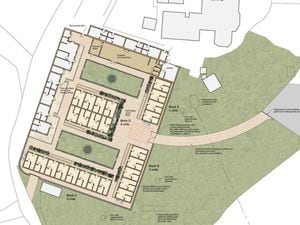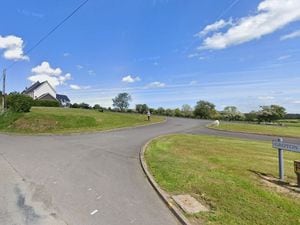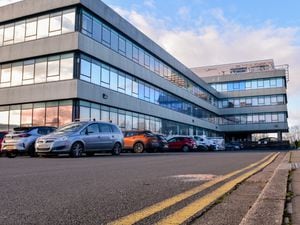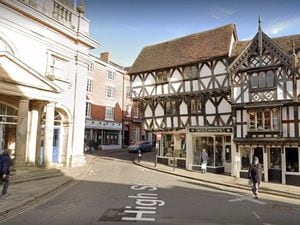Shropshire's Hope House Hospice a part of the Cox family for 18 years
This week is national Children's Hospice Week - and one Shropshire couple are telling their story to highlight the work of the charity.
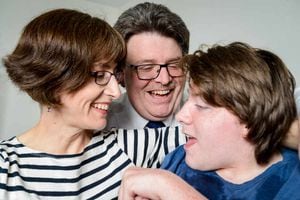
It should have been a time of unbridled joy. When young Shrewsbury couple Sarah and Robin Cox headed for Yorkshire with their baby son Simon 18 years ago, it was their first holiday together as a family.
But what happened on that trip meant their lives were never to be the same again. Simon would spend the next 18 years unable to see properly and confined to a wheelchair.
And Sarah and Robin will be forever grateful for the support of Shropshire's Hope House Hospice.
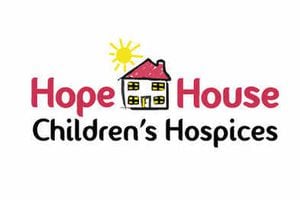
Every family which becomes acquainted with the Hope House Hospice has a remarkable story to tell.
Every individual benefits from its warmth and compassion, every patient from the selfless care and commitment from its staff.
The story of Sarah, Robin and Simon Cox provides a perfect illustration of the exceptional facilities that are on offer. Simon became ill as a young boy and has spent 18 years unable to see properly and confined to a wheelchair.
Staff at Hope House were there every step of the way to encourage and support, to empathise and understand.
Hope House is a remarkable institution. It provides support and care to life-limited children in addition to counselling, advocacy and the promotion of children and young carer's rights.
It offers physical, psychological and spiritual care. And it does so for 365 days each year, for 24 hours each day.
Service is characterised by being informal and friendly. The environment is homely. Patients and their families are treated sensitively at all times.
Remarkably, Hope House receives little in the way of public funding. In 2013, only £580,000 of its total £5.5 million expenditure came from the NHS or from other public bodies. The remainder was generated by the dedicated team of professionals and volunteers who support Hope House.
The story of Sarah, Robin and Simon serves as a reminder that we should not take Hope House for granted. It performs everyday miracles and improves the lives of poorly children and their families on a minute-by-minute basis.
It provides the type of specialist services that are simply not available from the NHS or from other organisations. And in order to stay afloat, it relies on the generosity and compassion of ordinary residents and fund-raisers, whose efforts pay for essential services.
The hospice has adapted. It is a highly professional organisation that operates to extraordinarily high standards. It's staff do not simply care for children, they also provide essential respite for parents and carers.
In a county that boasts many great treasures, Hope House stands out. Its wide range of therapies and highly developed services are better than many of those available in other parts of the UK. It is truly a centre of excellence.
In National Hospice Week, we should remember the constant battle Hope House wages to secure funding. And we should be appreciative for the positive work it does day-in and day-out.
Visit hopehouse.org.uk and togetherforshortlives.org.uk/childrenshospiceweek
This week is national Children's Hospice Week, and the couple are telling Simon's story to highlight the work the charity, which has its headquarters in Morda, near Oswestry, does for children across the county.
In 2013, Hope House spent £5.5 million supporting children and their families, but received just £300,000 from the NHS. Around another £280,000 was received in grants from other public bodies, with the rest having to be generated by the hospice's own fundraising department.
Simon was just five months when the disaster struck. Yet even before this, Sarah was concerned that all was not well. She was spending a lot of time at her local baby clinic, and Simon seemed to cry a lot and suffer from sickness. However, people who reassured her "that was what babies did", and that all new mums worried about their children's health.
Days into their holiday, Simon was taken seriously ill with a chest infection, and was rushed into a nearby hospital. Staff started to talk to Sarah and Robin about their son's development, particularly about the small size of his head. He was transferred to the Royal Shrewsbury Hospital, where a series of tests revealed he was suffering from microcephaly – a condition that covers a range of symptoms, including seizures and cerebral palsy, and which left him registered blind and confined to a wheelchair.
Returning home, life became a full-time merry-go-round of visits from physiotherapists, appointments with specialists and hospital trips. Making matters harder, they were trying to move house. It was then that a health visitor suggested taking Simon to Hope House for respite care. At the time, the couple knew little about the charity.
But after visiting Hope House, Sarah and Robin were taken aback by the level of care and expertise that the staff demonstrated.
"We wondered how they would manage to feed Simon because it wasn't at all easy," says Sarah. "But the care staff took Simon and fed him so well that we quickly realised they knew much more about babies like Simon than we did."
Knowing that Simon was in good hands meant that Sarah and Robin were able to take a well-earned rest.
"That gave us confidence to relax a bit and take a break. It was really nice to be able to share that role with Hope House," says Sarah. "It felt so good to have a night's sleep. Simon loves it at Hope House, he relishes all the attention and particularly likes the swimming pool and music therapy and because he is so happy we are able to relax."
Respite care at Hope House has also enabled Robin and Sarah to spend time with Simon's younger sister Rachel.
The support proved especially valuable during two occasions when Simon was taken ill, in 2001 and 2013. On these occasions he was treated first at Birmingham Children's Hospital, and later at Manchester, and both times specialist nurses from Hope House went to spend time with him so that Robin and Simon could take a break.
"They are there to help when you need it and that helps to prevent a crisis for families," Sarah said.
Since turning 18, Simon's health care has moved from children's services to adult services. So when he needs to go into hospital, he now goes to an adult ward, where he is not known to staff. But Hope House is still there for Simon. Staff from the hospice accompany him and provide moral and practical support in the adult environment.
This summer, Simon is also due to leave the Severndale Academy and move to Condover College for a holistic sensory course. It is going to be an exciting time. And while Robin and Sarah do not know what the future holds for their son, they do know how important Hope House has been in supporting them every step of the way so far.

